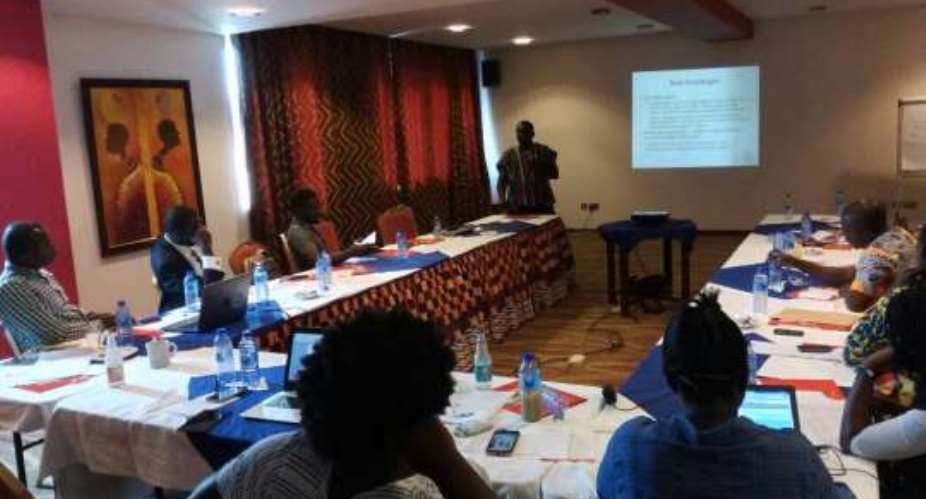Accra, Sept. 3, GNA - A two-day watershed training for members of the Ghana Wastsan Journalist Network (GWJN) is underway in Accra with a call on the public to change their unhygienic behaviours and support the clean agenda of saving the land.
Mr Kweku Quansah, the Deputy Director in-charge of Environmental Health Sanitation Directorate of the Ministry of Sanitation and Water Resources, who made the call on Friday, said when good hygienic practices are adopted, it would help address major sanitation challenges confronting the country.
He said: 'According to a WHO research in 2016 the extensive adoption for hand wash and sanitation will reduce diarrhea diseases by 89 per cent.'
Mr Quansah said to complement the clean, safe agenda, the Ministry would employ 40,000 sanitation workers to support the already 4, 000 plus sanitation health workers to help increase and promote the campaign.
'This has become necessary especially when 60 per cent Ghanaians use shared toilet facilities, with 15 per cent having access to improved toilet facilities while 19 per cent practice open defecation hence making Ghana to be perceived in international circles as among the least clean countries in the world,' he said.
Mr Quansah said when it came to open defecation in the country, following a 2014 demographic report based on regions; Northern region was ranked highest with 67.6 per cent while Ashanti and Greater Accra had 6.6 per cent respectively and being ranked as lowest.
'Central Region had 13.5 per cent, Brong Ahafo 6 per cent, Eastern 9.1 per cent, Upper West 49.7, Upper East 21 per cent, Volta 23.6 and 7.2 per cent for the Western Region,' he said.
On a regional waste generation research conducted in 2010, the Deputy Director in-charge of Environmental Health Sanitation Directorate of the Ministry of Sanitation and Water Resources said Ashanti Region was leading with 3,363,126 with the Upper West Region recording 493,953.
Accepting the challenge that had been there all these years, Mr Quansah said the only way that could make these setbacks be addressed was through the enforcement of laws and the collaboration of the media in exposing culprits and letting them know their actions that hinder sanitation in the country are bad.
Mr Patrick Apoya, the Executive Director of Fox Limited, a Consultancy firm in the WASH Sector, said despite the high access to safe water supply (80 per cent) it fell short to 20 per cent under the Sustainable Development Goals which requires that water be safely managed and available.
The training, which forms part of a five-year project of Watershed Ghana has the objective of building media capacity in advocacy to enable them work with other partners towards the push for the integration of Water Sanitation and Hygiene (WASH) and Integrated and Water Resources Management (IWRM) had about 20 members of the GWJN across the ten regions participating.
The training was sponsored by IRC of Netherlands.
Some members who spoke to the Ghana News Agency said the training had enlightened them on the critical issues in the WASH and IWRM sector.
The Watershed Ghana work package, a component of a 5-year multi-country strategic partnership between the Dutch Ministry of Foreign Affairs and IRC (lead), Simavi, Wetlands International and Akvo, to deliver improvements in water, sanitation and hygiene (WASH) services through CSO advocacy and lobby was launched in Accra on 30 June, 2016.





 Supreme court declares payment of wages to spouses of President, Vice President ...
Supreme court declares payment of wages to spouses of President, Vice President ...
 Publish full KPMG report on SML-GRA contract – Bright Simons to Akufo-Addo
Publish full KPMG report on SML-GRA contract – Bright Simons to Akufo-Addo
 Kumasi International Airport to begin full operations by end of June
Kumasi International Airport to begin full operations by end of June
 Election 2024: Our ‘real challenge’ is getting ‘un-bothered’ youth to vote – Abu...
Election 2024: Our ‘real challenge’ is getting ‘un-bothered’ youth to vote – Abu...
 [Full text] Findings and recommendations by KPMG on SML-GRA contract
[Full text] Findings and recommendations by KPMG on SML-GRA contract
 Renegotiate SML contract – Akufo-Addo to GRA, Finance Ministry
Renegotiate SML contract – Akufo-Addo to GRA, Finance Ministry
 J.B Danquah-Adu murder trial: Sexy Dondon to Subpoena Ken Agyapong, Ursula Owusu
J.B Danquah-Adu murder trial: Sexy Dondon to Subpoena Ken Agyapong, Ursula Owusu
 Galamsey: Five Burkinabes jailed 20 years each for mining
Galamsey: Five Burkinabes jailed 20 years each for mining
 'It's no crime' – Abu Sakara defends Alan's exit from NPP
'It's no crime' – Abu Sakara defends Alan's exit from NPP
 'We know all your houses, pay your bills now or we’ll disconnect you; we're all ...
'We know all your houses, pay your bills now or we’ll disconnect you; we're all ...
